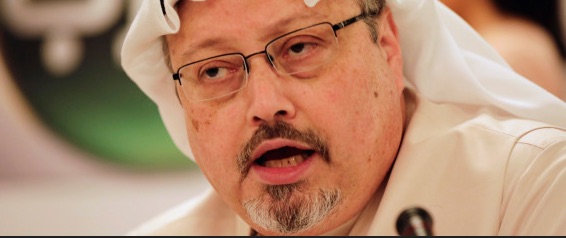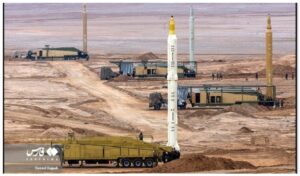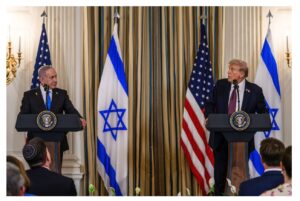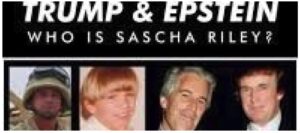By Douglas A. Yates
In near lockstep, the media industry used the murder of Jamal Khashoggi to elevate his status to a journalist, a truth-teller. The Saudi official in exile is presented as a champion of peace and justice in the Mideast. However, when the claims are matched to Khashoggi’s life, the resulting profile suggests pertinent facts are missing.
In the 1980s, Adnan Khashoggi (1935-2017), Jamal’s uncle, was among the richest men in the world. Backed by the Kingdom of Saudi Arabia (KSA), Adnan was a premier weapons dealer for more than 30 years.
When mercenaries, hired by corporate proxies, required lethal tools to claim ground and control it, the elder Khashoggi was the guy who arranged sales and delivered the freight. With a Boeing airliner at his disposal, Adnan moved bombs and boots to hot zones in Africa’s Sahel, Iran, Iraq, Afghanistan, and the Balkans. The CIA guided his sales; Lockheed paid his commissions.
His lucrative errands usually ran ahead of oil discoveries and pipeline routes. The Boeing’s backhaul (illicit drugs, gold, or re-processed nuclear fuel) serviced contraband ratlines protected by secret government contracts.
Jamal was born and bred to follow his uncle’s path. His grandfather was King Ibn Saud’s physician. He worked for the head of Saudi security for 24 years. He was King Abdullah’s personal assistant (2005-2015).
While posing as a journalist, Jamal was a loyal member of the kingdom’s propaganda apparatus. With an American education and global connections, he glossed the barbarity of the king’s iron fist. The Muslim Brotherhood’s brand of strict religious and social control expanded under his promotion.
In the 1990s, he was an intimate of Osama bin Laden, and may have procured Stinger missiles for jihadists in Afghanistan. He was privy to details about KSA’s role in the 9/11 attacks.
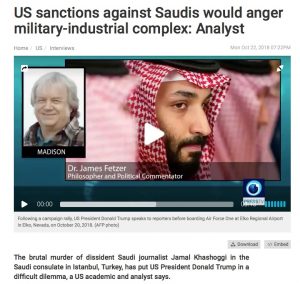
To watch the PressTV interview, click here.
One year ago (Nov. 4, 2017), 33-year-old crown prince Mohammed bin Salman (MbS), in suspected coordination with President Trump, neutered the kingdom’s old guard. Firebrand clerics, A-list billionaire princes, governors, and regional deputies were declared corrupt, held captive, and tortured. Several princes resisted but were killed in gunfights and helicopter crashes.
The “night of long knives” set off financial tsunamis in City of London and Wall Street boardrooms. Most of the captives were released after MbS recovered $100 billion. Coerced loyalty pledges likely sealed the deal.
Jamal escaped the purge, flying to America a few months ahead of it. He told friends if he returned he’d be thrown in jail. The Washington Post offered a bullhorn for an artfully blended script of moral outrage and progressive sentiment. It was the Deep State talking.
Long regarded a CIA mouthpiece, the newspaper (now owned by Jeff Bezos, the richest man in the world) published Khashoggi’s op/eds in English and Arabic. Coordinated by a rouge clique of former and present intelligence agency officials, the aim was to restore the old guard and weaken Trump.
The kingdom controls 25 percent of the world’s daily production of sweet crude. Its abundance and quality provides favored tribes with a life of leisure and opulence. Victims of the new order (about 400 princes: brothers, cousins and uncles) are aggrieved by their downsized circumstances. Tribal loyalties are fragile; anxiety over escalating costs and shrinking patronage threatens the stability of upper echelon subjects.
The kingdom’s war against Iran in Yemen has drained over $50 billion from the economy to little effect. Jamal criticized the military campaign to expose MbS’s inexperience. But Jamal knew the rules; dissent leads to disappearance. He was likely baited to the Istanbul consulate, believing he was meeting conspirators plotting to topple the crown prince.
The Greek playwright Aeschylus recounts the drama in 458 BCE, “By the sword you did your work, and by the sword you die.”
When diplomatic affairs mirror Pulp Fiction, truth-seekers are reminded that oil-fueled oligarchies are arrogant and impudent. To cover their tracks and stifle dissent, they lie, steal, and murder. The truism applies to republics as well as monarchies. Who speaks for Michael Hastings and Gary Webb today?
The media industry is not immune from political exploitation. With Khashoggi’s gruesome murder, doubt and suspicion converge (see Operation Mockingbird) over reporting that omits details of his career and family’s personal relationship with KSA’s dictators.
Moving ahead, identify false narratives. Read history, read widely. Support free speech. Ask questions; don’t settle for platitudes; use the Internet to follow issues and search for answers. Uncritical acceptance of media – any media – resembles the origins of the opioid crisis. Experts vouched that Oxycodone was safe and effective. Critical discernment requires thinking; our schools should teach it.
Douglas A. Yates is a photographer and writer. He lives in Ester, Alaska.
